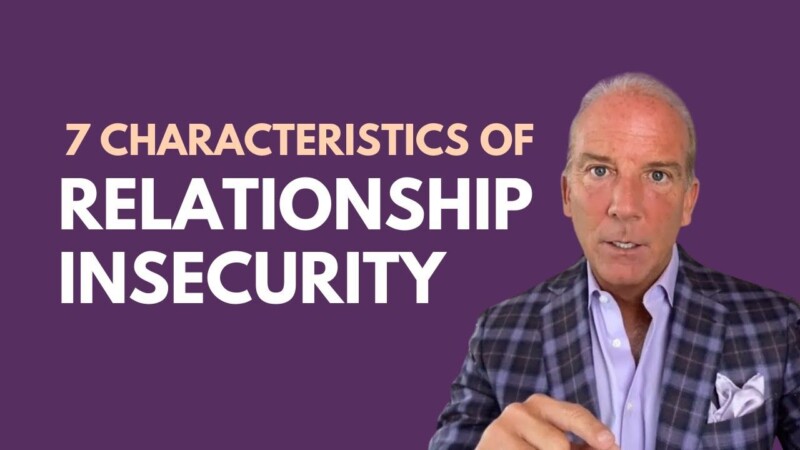Are you constantly afraid that you’re going to lose your relationship?
In today’s article about relationship, I share how insecure people tend to think and behave. what their underlying beliefs are about themselves, and what they can do to get the security they crave and deserve.
These characteristics have been coined many different things: relationship insecurity, anxious attachment style. Clinically, this is called love addiction.
Don’t worry about the threatening name or shame yourself. Everything we love in life, like our favorite food or comfortable clothing creates the same basic reaction involved in addiction.
It is just my preferrence to not use the politically correct, innocouous terms that most use. One of the core ingredients to recover from anything is to get into “reality.” Therefore, as helping professionals.
if we don’t call things what they actually are for fear of offending, we are doing a disservice. We are enabling the person in need to stay out of touch with “reality.” That goes against my morals and values.
What are the 7 characteristics of love addiction and relationship insecurity?
- Overthinking. This was me all my life! I would replay conversations, looking at texts, trying to decipher every little nuance.
- The critical distinction is the thoughts are obsessive and always about trying to figure the other person out.
- Catastrophe thinking. This happens when there is a communication gap. Even the slightest little pause in texting or talking triggers the love addict to project fears that the relationship might be over.
- That their partner might be angry with them or something is wrong.
- Needing constant reassurance. This was also me – I learned it from my mother.
- It was common for our family to be at dinner talking about politics or some other topic, and my mom would all of a sudden blurt out.
- How do I look in this dress? While I never did that, I did need constant affirmation from my partner yet it never satisfied.
- Bringing the past into the current relationship. Love addict’s internal fear creates an obsessive need to keep themselves safe.
One of the ways they attempt to stay safe is by comparing the past to the present.
- For instance, I would constantly compare things my current girlfriend did to what my last girlfriend did.
- This attempt to avoid pain makes it impossible to be present, and being so hypervigilant can lead to the end of the relationship.
- Give too much time, attention, and power to the other person. The love addicts desperate need to avoid abandonment creates a disempowering abandonment of themselves.
- They do this by over-emphasizing their partner’s strengths by elevating them to fantasy. This results in the addict making their life about the other person. The addict gives up their interests, space, and desires. There is far too much attention on their partner and not enough on themselves. They effectively make the other person their higher power.
- Snooping. Love addicts will feel the need and even demand to check their partner’s phone or email or look at their partner’s social media too much.
- They will want to keep tabs on where their partner is going and who they are with. They are on constant alert for the possibility that they are being replaced.
- The last characteristic is the inability to feel whole or happy outside of a relationship.
- Love addicts will feel empty, sad, depressed if alone and often enter new relationships, even destructive ones, or relationships with someone they are only mildly interested in just to avoid being alone.
Now let’s get into the 7 solutions:
- Face our self-deception and acknowledge the truth. This means we have to get into the “reality” that our expectations are addictive.
- Our desire for unlimited positive regard and our demand for so much time and attention from the other person is excessive.
- We have to recognize that how we define love is distorted, and we have recovery work to do on our codependence.
The following three steps come from Al-anon and are called the three “gets.’ Step one is to get off their back.
- Our constant wondering what they’re doing, our need for continuous attention, overthinking all of their thoughts and actions, and snooping is evidence that we are “on their back” and paying too much attention to their life and not our own.
- Get out of their way. This means we have to stop trying to dictate or correct how they live their life. Let them be who they want to be.
- Don’t try to change them or get them to meet our needs. They’re okay the way they are. It’s not our place to critique, judge, and tell them who to be.
- This is also a defensive projection. We avoid focusing on healing ourselves by making them the problem.
- Get on with our own life. Instead of putting all our time and attention into them, put it into ourselves! Learn to meet our needs ourself, get back to living our own life, and pursuing the hobbies, friendships, and interests we gave up when the relationship began.
- Self-esteem work. For the love addict, their internal sense of security now is based on their partner or the object of their pursuit.
- They must start developing the belief that they have inherent value at all times and not only when they are in a relationship.
- Develop boundaries. This can be difficult for the addict. So here is a suggestion. I want you to think of gas pedals. Take your foot off the accelerator (constantly being vested) and pull way back.
- If your partner shares a little bit, going about 8-10 MPH, join them. Maybe try to advance to 12-13 MPH, but if they back off, we back off.
Here’s how we know when we’re doing this right
- we should feel like we’re cold, mean, selfish, and disinterested. We should feel uncomfortable because we’re used to the gas pedal being pushed to the floor. When we feel this new discomfort.
- we’ll know we’re no longer acting addictively or anxious. Now we’re acting moderately. In no time, we’ll get used to it, and things will get better.
- Work with an expert. The addiction was created by childhood abandonment, and working with an expert is the only way to overcome it.
- We are too close to the situation to see our behaviors accurately and we don’t have access to the knowledge, skills and tools that the expert will provide us.
- I encourage you to pick up Pia Mellody’s Facing Love Addiction and Facing Codependence as well as Beverly Engle’s The Emotionally Abusive Relationship.
- These books will help the addict begin getting into reality about how abandoned we were in childhood.
- Furthermore, we will become more aware that many of the behaviors we believe are kind, authentic and loving are in fact, destructive and self-sabotaging.
There are your seven solutions!
Remember, the person struggling with love addiction is not bad or weak. They are in pain and doing the best they can not to feel that pain.
Addictively pursuing someone is the only way they currently know how to alleviate that pain. Sadly, if left untreated, it creates more of the pain they are desperately trying to avoid.
But there is hope. By gaining new knowledge, skills and tools and then putting a plan in place to heal the underlying pain, we can find the authentic love we crave and deserve.
Enjoy The Journey! ??
Are You Tired of Feeling Like You’re Not Good Enough?
Do you feel like no one will ever love or accept you unless you are perfect?
You are not alone. We’ve all felt this way at some point in our lives.
But it doesn’t have to be this way. It is possible to overcome these feelings and live a life full of self-love and acceptance.
Learn the seven characteristics of high self-love and how it can change your life for the better. Stop feeling lonely, rejected, or like an outsider in this world.
This masterclass provides the knowledge, skills, and tools for overcoming low self-esteem and accepting who we are as individuals – flaws included!
By the end of the class, participants will learn to take control of their lives by learning a simple process to stop negative thoughts.
That same process will show you how to turn feelings of loneliness, rejection, and emotional wounds from the past into unshakeable self-confidence.
The result is an individual who feels confident in themselves while also embracing their perfect imperfections.
Imagine how exciting it will be to embrace change without fear; take risks with ease; communicate your needs and wants decisively, and simply shrug off attempts by others to judge or criticize you.
Get started on changing your life today by signing up for our online masterclass “How To Love And Accept Your Perfect Imperfections!” TODAY!





 The Greatness University
The Greatness University 